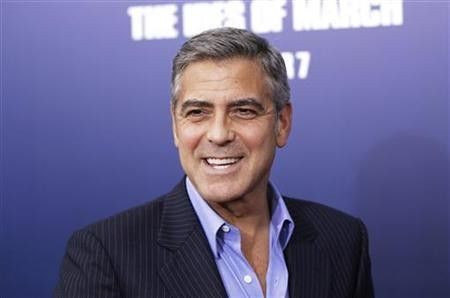Clooney, Gosling shine in Ides of March

Moneyball pushes the theory that baseball games aren't won by the best players but rather by those who can just consistently get on base. And now comes The Ides of March to remind us that nothing in politics -- not ideas, not image, not intelligence -- matters as much as winning elections.
And you really don't want to know the lengths to which people will go to score that victory.
Our guide through the sausage-making hell that is political primary season is Stephen Myers (Ryan Gosling), a hotshot young consultant who's already a seasoned veteran of this world.
While he's generally a cool customer, Stephen is obviously starry-eyed about the campaign of Governor Mike Morris (George Clooney), the kind of liberal dream-candidate who's politically viable only in the movies.
He's an atheist who wants to phase out combustible-engine cars in the next decade, but we're supposed to believe that the GOP thinks Morris is more of a threat in November than his Democratic opponent. So if Dennis Kucinich looked more like George Clooney, he'd be president now?
As Morris and his team, run by Paul (Philip Seymour Hoffman), try to figure out how to curry favor with power broker Sen. Thompson (Jeffrey Wright) without promising him the Secretary of State job, Stephen gets a call to secretly meet with Tom Duffy (Paul Giamatti), the campaign manager for Morris' rival.
If you've seen Beau Willimon's play Farragut North, on which this film is based, you might have wondered why the trailers completely reveal Stephen and Paul's rendezvous, and the repercussions it has on Stephen's career, when that's essentially the whole story.
But The Ides of March, written by Clooney and Grant Heslov and Willimon, takes the play as merely the launching pad for a whole other plotline involving Stephen's dalliance with an intern (Evan Rachel Wood) who sets in motion a series of events in which Stephen will learn the hard way how far he -- and Morris -- will go to remain atop the political heap.
While it's not nearly as quotable as Sweet Smell of Success, Ides frequently reminded me of that earlier classic in its portrait of the corrosive nature of power, and the soul-killing acts that people will commit to get or to keep it. We see Stephen as experienced and anything but starry-eyed, but over the course of the tale, his trajectory grows ever more dark and cynical.
Clooney's principal ability as a director is his skill for assembling talented casts and getting their best work, and that's certainly on display here. The actor himself nails the I-feel-your-pain empathy of so many contemporary politicians, and even when he's cornered and squirming, Governor Morris never completely drops the public mask he shows to the cameras.
Gosling reminds us of the dictum that acting is all about listening and reacting -- Stephen is cagey enough to understand the gamesmanship of the most innocent conversation, even if that skill fails him when he needs it most, and we see the negotiations going behind every furrowing of his brow.
Hoffman and Giamatti are two of our most compelling screen actors these days, and I wish they'd gotten more opportunities to face off here, but they're still fascinating in their separate corners. Marisa Tomei feels completely convincing as a New York Times reporter constantly angling for a story, and Jennifer Ehle once again nails a small role (as Mrs. Morris) that makes you remember her as the lights come up. (Ehle is one of the few actresses today so willing to hide herself in her work that I never recognize that it's her until I see her name in the closing credits. And in this day of overexposed celebrity, that's very much a good thing.)
While Clooney brings many strengths to the director's chair, he's not much of a visual stylist. Not that he has to bombard the audience with razzle-dazzle, but a little more attention in this area could certainly liven up a film that too often betrays its stage roots. His most exciting movie to look at, Confessions of a Dangerous Mind, was also one of his least financially successful, and it would be a pity if that film's failure at the box office scared him away from moving the camera more.
The timing couldn't be better for a movie that reminds us that even the most trustworthy of politicians more likely than not sold out a good chunk of their principles at some point or other on their way to high office.
The Ides of March knows better than to try and offer any solutions to the current political process, but -- like the Occupy America protests currently unfolding from coast to coast -- sometimes it's enough just to highlight the problems that need fixing.
© Copyright Thomson Reuters 2024. All rights reserved.





















